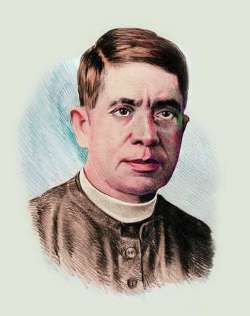St. Cristóbal Magallanes

St. Cristóbal Magallanes
Cristóbal Magallanes Jara was born in Totatiche, Jalisco, Mexico on July 30, 1869. He was son of Rafael Magallanes Romero and Clara Jara Sanchez, who were farmers. He worked as a shepherd in his youth and enrolled in the Conciliar Seminary of San José in Guadalajara at the age of 19.
Cristóbal was ordained at the age of 30 at Santa Teresa in Guadalajara in 1899 and served as chaplain of the School of Arts and Works of the Holy Spirit in Guadalajara. He was then designated as the parish priest for his hometown of Totatiche, where he helped found schools and carpentry shops and assisted in planning for hydrological works, including the dam of La Candelaria. He took special interest in the evangelization of the local indigenous Huichol people and was instrumental in the foundation of the mission in the indigenous town of Azqueltán.
When government decrees closed the seminary in Guadalajara in 1914, Magallanes offered to open a clandestine seminary in his parish. In July 1915, he opened the Auxiliary Seminary of Totatiche, which achieved a student body of 17 students by the following year and was recognized by the Archbishop of Guadalajara, José Francisco Orozco y Jiménez, who appointed a precept and two professors to the seminary.
Magallanes wrote and preached against armed rebellion, but was falsely accused of promoting the Cristero Rebellion in the area. Arrested on May 21, 1927, while en route to celebrate Mass at a farm, he gave away his few remaining possessions to his executioners, gave them absolution, and without a trial, he was killed four days later with Agustín Caloca in Colotlán, Jalisco. His last words to his executioners were "I die innocent, and ask God that my blood may serve to unite my Mexican brethren." He was succeeded as parish priest of Totatiche by José Pilar Quezada Valdés, who went on to become the first bishop of the Archdiocese of Acapulco.
Christopher Magallanes was canonized by Pope John Paul II on May 21, 2000. His annual liturgical celebration in the Latin Catholic Church is assigned as an optional memorial to May 21st.
